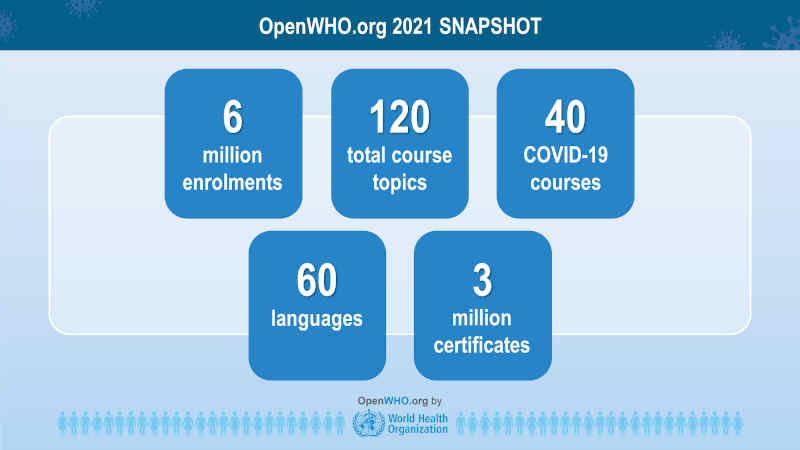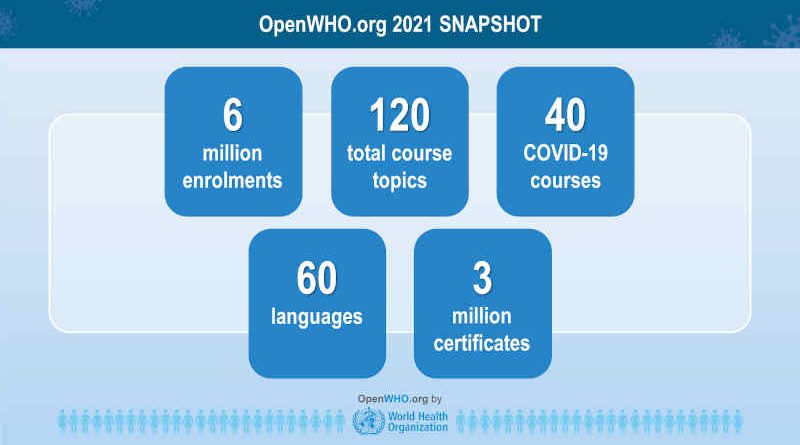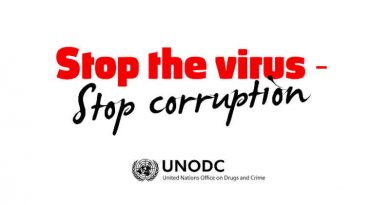OpenWHO Offers 40 Courses to Support the Covid-19 Response

OpenWHO will continue to grow its learning portfolio in 2022 with a focus on serving countries with localized content.
In its fifth year of operation, WHO’s OpenWHO.org learning platform has undergone significant development and expansion to meet the ongoing challenges of complex health emergencies globally. With increased engagement among learners during the Covid-19 pandemic, a series of major milestones were reached in 2021 highlighting the role OpenWHO plays in strengthening global health emergency response through online knowledge transfer.
By December 2021, OpenWHO had registered more than 6 million course enrolments and awarded more than 3 million certificates, the latter for course completion or surpassing the prescribed course assessment score. In total, learners have amassed more than 27 million video views across all platform content, comprising more than 693,000 hours of video streaming on connected devices. Along with a course completion rate well above the industry average for online learning, these milestones highlight the growing demand for relevant, high-quality learning resources in emergency contexts.
According to WHO, the scope of learning content across the platform has also grown to 120 total course topics, with 40 courses to support the Covid-19 response and 80 courses on other essential health topics, including an additional 23 diseases. Increased demand for reliable guidance during the Covid-19 pandemic is confirmed by measures of the most utilized learning content on the platform: Introduction to Covid-19 and Covid-19 personal protective equipment were the most visited and completed courses, respectively, and the animated Covid-19 explainer was the most popular video. Among the 18 OpenWHO learning channels, the Covid-19 channel was the most popular.
In demographic terms, students and health professionals, learners from India and those aged 20-29 are the most frequent visitors to OpenWHO. Among all learners, OpenWHO found that nearly half have enrolled in at least 2 courses and 71,000 superusers have completed at least 10 courses. Leveraging these repeat and superusers and to encourage learner activity more broadly, digital badges were introduced this year, with more than 60,000 badges already issued for course completers to share their learning achievements on social media.
To further increase learning uptake, OpenWHO now offers courses in 60 global languages, including the 15 most-spoken languages in the world as well as languages with high impact for affected populations, especially those in the least-developed countries. The Introduction to Covid-19 course was the most translated course and the French language was the most translated language. OpenWHO will expand these localization efforts going forward, with additional languages and translations underway to meet the growing demand.
“For almost 2 years, we have worked together with amazing crowd power from all corners of the world and in particular from WHO country and regional offices to help ensure equitable access to pandemic and emergency-related WHO technical guidance in a large variety of languages. Evidence shows that accessing learning in preferred languages enhances uptake and comprehension and further can help save lives,” said Heini Utunen, acting Head of the Learning and Capacity Development Unit for the WHO Health Emergencies Programme.
Even with these expanded activities, the OpenWHO mandate to provide free, self-paced, accessible courses to improve health emergency response has remained unchanged. The platform continues to make life-saving knowledge available on a massive scale, not only to improve emergency response, having served frontline responders in outbreaks from Ebola to plague and now Covid-19, but also in anticipation of the next pandemic.
According to WHO, it is with this aim that OpenWHO will continue to grow its learning portfolio in 2022 with a focus on serving countries with localized content, thereby strengthening health response globally and better serving affected populations now and in the future.





